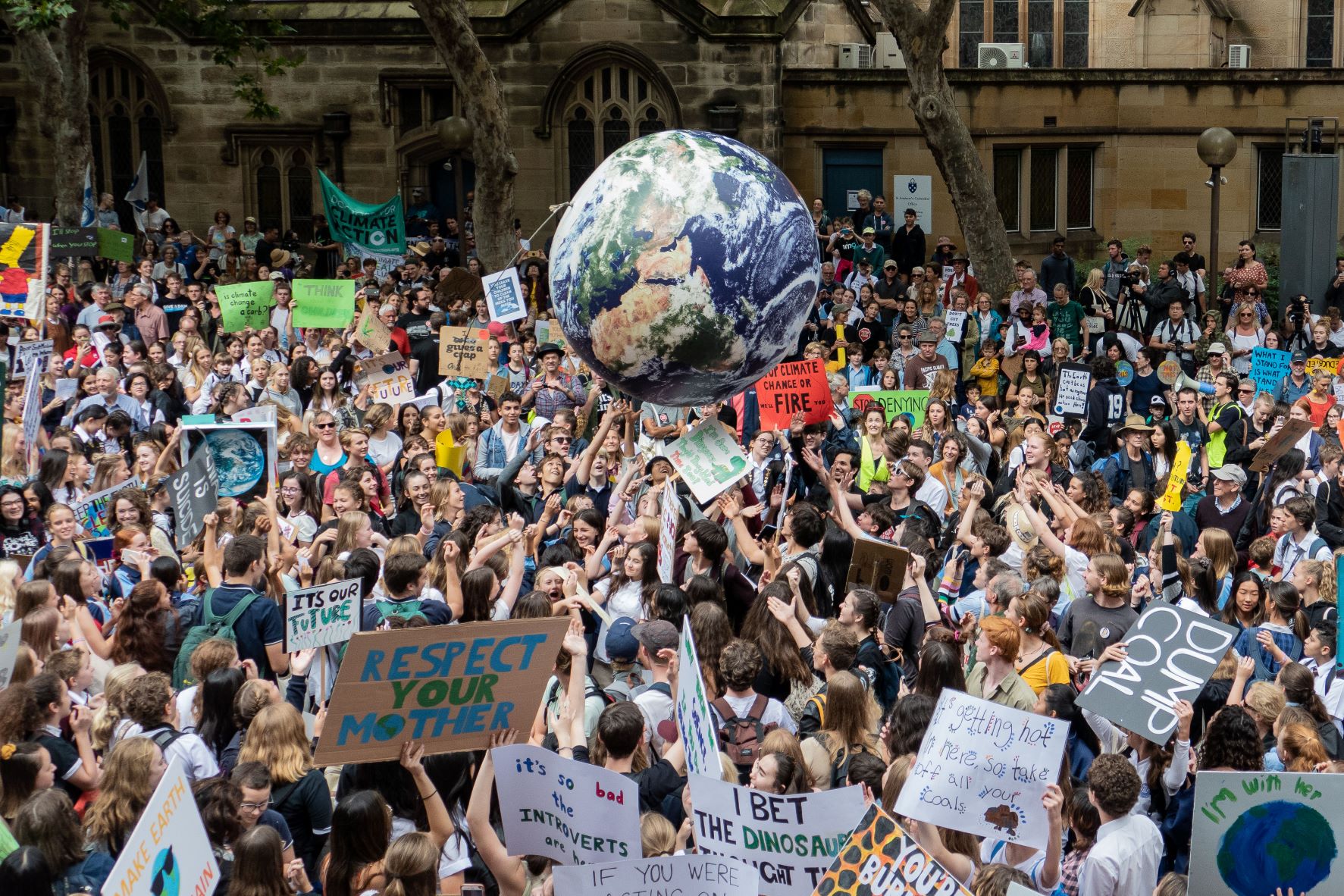Climate is back in the news. Under the motto “People Not Profit”, the folks at Fridays For Future have called on March 25th the first real global strike (almost) post-pandemic. This time, however, the objective of the mobilization is not a generic “wake-up call” to curb emissions and global warming, but focuses on a very specific issue that unfortunately has always been postponed and neglected in climate negotiations: compensation for the most vulnerable countries and communities that are generally less responsible for the effects of climate change. Climate justice, in short. Because – in spite of the pandemic, in spite of the war – the clock of climate change will not stop and for hundreds of millions of people adaptation will be a matter of life and death.
In the meantime, we have discussed climate, adaptation, energy transition and international crisis with climatologist Stefano Caserini, author of “The climate has (already) changed” (Il clima è (già) cambiato).

I'd like to start with a piece of news from a few days ago that went almost unnoticed: Antarctica has recorded temperatures 40 degrees above the seasonal average. It sounds disturbing. How should we interpret this data?
It must be said that within the modification of the global climate there are sometimes random variations, unexpected phenomena of short duration. It can be a matter of very accentuated temperature variations either in a positive sense, as in this case in Antarctica, or on the contrary, as sometimes happens on the east coast of the United States, of cold spells, i.e. cooling phenomena related to the Arctic circulation shifting. Phenomena such as the one recorded in Antarctica are certainly a red flag, but for Antarctica the real problem is actually the slow reduction of ice: something less conspicuous and of which only scientists speak now, but which can become devastating.
For example, a couple of months ago the glaciologist Marco Tedesco has written an article that passed quite unnoticed, but if read carefully it sounds terrifying. According to the latest monitoring on the state of the Thwaites glacier in Antarctica, there are chances that the destabilization of this huge ice sheet, as large as Great Britain, will raise the sea level of 65 centimeters in just 5-10 years: this would mean the expected rise in 2100 would occur within a decade. It would totally change the perspective also for the possibilities of adaptation.
Speaking of adaptation, the second volume of the VI IPCC report dedicated to climate adaptation was released on February 28th. Among the various points of concern, one in particular, also highlighted in the speech of the UN Secretary-General Antonio Guterres, concerns the insufficient investment to help the countries most vulnerable to the effects of climate. It is no coincidence that the global strike called by Fridays For Future on March 25th had a very precise goal this time: climate justice. Will we ever get around to seriously addressing this crucial issue?
I don't know if we'll ever get there.... What I can say is that certainly these young people show that they have a very clear understanding of the central issues of climate change and dedicating the event to this issue is a sign of maturity. Certainly in this historical moment, with the war and the international crisis, it is not easy to have confidence in a multilateral framework that helps true climate justice. What can be said, however, is that the problem is well outlined and the IPCC report shows us the extent of the impacts that affect the South of the world, which, starting with water scarcity, are frightening. Guterres himself said in his speech that he had never seen a report like this.
Adaptation is therefore a matter of life and death for many people. The hope is that there will be more funding in the UNFCCC to help the countries in the Global South and above all that we find a way to spend it properly. In fact, the problem is not only to make the money available, but also to have infrastructures and organizations that are able to channel these funds in effective actions of adaptation and mitigation, avoiding the risk that they end up in weapons or to finance the ruling elites.
At the beginning of April the third volume of the IPCC report will be released, this time dedicated to mitigation. You have been one of the reviewers: can you tell us something in advance?
Well, I can't preannounce what's going to be in the report.... But I can say that the IPCC reports summarize the scientific literature, and it is clear from the scientific literature that it is possible to reduce emissions to meet the goals of the Paris Agreement. It is difficult, but not impossible. It requires radical changes in investments and policy priorities, but it's not something that belongs in a dream world and so it remains a wishful aspiration. These are things that can be done or not done, depending on how much importance you place on the issue of climate justice and the rights of future generations. Of course, if the primary objective is business and the defense of the short-term interests of the fossil fuel industry, if we remain trapped in the logic of an economy measured only on the basis of GDP, then there will be no room for the transition we need. Political choices are needed.
For example, we already knew in Italy that we had a problem of gas interdependence, but it was still decided to invest even more in fossil gas and slow down the development of renewables. There are responsibilities that have names and surnames, governments and ministers who have made these choices. Now it seems that the delays have generated themselves and that the wrong energy policy choices were inevitable. I fully understand these young people when they ask to change a ruling class that has proved inadequate to manage the problem of climate change.
Speaking of energy choices at the European level, how do you feel about the inclusion of nuclear power within the taxonomy for green investments?
It is a distraction. Those who already have nuclear power, such as France and China, will keep it. In the Western market economy and also for Italy, it makes no sense to think of a development of nuclear power that is useful for this transition, which must be done in twenty years. The same promoters of nuclear energy and nuclear fusion say that before twenty years there is no way to have reactors on a commercial scale. It's unlikely, therefore, that nuclear power will be able to compete with a system of renewables – wind and solar power in the forefront – which, if already more convenient today, will be even less expensive in twenty years.
The projections that we have available, including that of the International Energy Agency, do not see a decisive role for nuclear power in the energy transition, as the sun and wind do. Among other things, they also have fewer problems related to supply or possible terrorist attacks. In short, nuclear power is a way to shift the focus. The reality is that we will make the transition with energy efficiency, solar and wind: these are the three main innovations, also decided by the market.
What are the consequences that the war in Ukraine and the international crisis will have and are already having on climate action and transition?
It is not easy to understand. Certainly there is a weakening of the multilateral system, which in the UNFCCC finds an important moment of encounter between different positions to try to have a common action on climate. On the other hand, however, there are clear signs that this war and the resulting energy crisis, with the consequent increase in prices, is pushing renewables even more. Several observers are reporting that the conflict in Ukraine could lead to an even faster energy transition. We already knew we had to get rid of gas, but this war is a constant wake-up call telling us to hurry. Of course it's not easy to replace all the Russian gas right away, but the direction to follow is clear.
However, there is talk in the meantime of reopening the coal plants…
Yes, but it will be transitional. Unless we suspend the European Emission Trading System, coal-fired power plants are economically unsustainable. There is a cap on annual emissions allowed in Europe, so coal plants would steal more ground from the steel industry, cement industry, gas plants, etc., and the price of CO2 would rise. The price is already increasing today: in the last year we have gone from 40 to 80 euros per tonne; a price that puts coal out of the market. It is clear that if you don't have anything to produce energy, then you will use coal as well. However, the clear signal of this crisis is that we will get out of it by using the sun and the wind and with the contribution of a few other renewable energies.
Stepping outside the purely energy context for a moment, I would like to ask you a question: why is there so little talk at the climate negotiations about the circular economy, which could also make a great contribution to climate action?
The point is that CO2, which is responsible for 80% of the global warming problem, is mostly generated by the burning of fossil fuels. In short, almost all CO2 emissions are due to energy production and the manufacture of cement and steel. So the heart of the matter is to stop using fossil fuels. Then certainly part of the solutions can be related to the use of materials and reducing their consumption. But the climate issue is fundamentally about producing energy differently.
Of course, but the circular economy implies a real economic paradigm shift that is never directly addressed at the climate tables. Just as, for example, the issue of plastics, which are in any case derived from fossil sources, is not addressed…
It's because plastic is ultimately a way to store carbon. That is, if oil is used to produce a plastic artifact that is then landfilled, that carbon, if it doesn't degrade, will have been separated from the atmosphere forever and therefore from a climate change perspective is not a problem. Then we can list all the reasons why this should not be done, but storing carbon in wood or plastic artifacts is one way to avoid putting CO2 into the atmosphere.
Going back to the climate tables, when people tell me that there are a lot of issues missing in the Paris Agreement, I have to point out that it's only 30 pages and there certainly can't be everything in it: there is a very concrete focus on the main things, which is the energy transition. And after all, to be exhaustive on climate change you would need an encyclopedia!
One final question. One of the problems with the climate crisis is keeping the media's attention. But lately, first with Covid and now with the war in Ukraine, climate always takes a back seat. What are your thoughts on that?
Well, it's understandable that media attention today is focused on a tragedy as devastating and even dangerous as the war in Ukraine. War is a cataclysmic catastrophe that can bring enormous destruction overnight. Climate change, on the other hand, is a "slow-motion" catastrophe, which is why the media for a long time ignored it and even now struggle to talk about it: Thwaites glacier melting is not "sexy"…
Obviously a war, and even a pandemic, capture much more attention. But still, climate change is always there, and in July we'll see how much it will be talked about. In fact, the hope is that in July we will return to talk more about climate than about war.
Photo: Australia, climate strike 2019 (Shutterstock)



